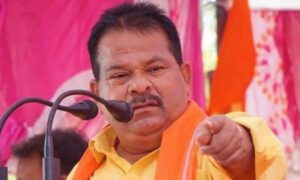
Gitanjali J Angmo, the wife of activist Sonam Wangchuk, told the Supreme Court on Wednesday that his detention under the National Security Act is “a calculated attempt” to prevent him from exercising his democratic and constitutional right to dissent, The Indian Express reported.
In an application seeking the court’s permission to amend her petition against his detention and raise additional grounds, Angmo said that Wangchuk’s detention must be set aside as safeguards under the Act had not been followed.
She also denied that the activist had ever acted in a manner prejudicial to maintaining public order or security in Laadakh, the newspaper reported.
Wangchuk was arrested in Leh on September 26 under the National Security Act, two days after four persons were killed in police firing during protests seeking statehood for Ladakh. He was later taken to a jail in Rajasthan’s Jodhpur.
The police firing and violence broke out on September 24 during protests demanding statehood for Ladakh and its inclusion in the Sixth Schedule of the Constitution. Demonstrators clashed with and threw stones at the police, and set fire to the Bharatiya Janata Party office and a police vehicle.
The Union government has claimed that the violence was incited by Wangchuk’s “provocative statements”.
Earlier this month, Angmo had filed a petition before the Supreme Court challenging his detention under the National Security Act.
On Wednesday, a bench of Justices Aravind Kumar and NV Anjaria allowed Angmo to make changes to the application, The Indian Express reported.
The court allowed Angmo to file the amended petition within a week, after which the respondents could file additional statements within 10 days.
The matter was then listed for further hearing on November 24.
In her application before the court, Angmo said that it was “wholly preposterous” that after more than 30 years of being recognised for his contributions to grassroots education, innovation and environmental conservation in Ladakh and across India, Wangchuk would “suddenly be targeted”.
Angmo also noted that the activist had earlier been served with notices for land lease cancellation, Foreign Contribution Regulation Act cancellation, an initiation of a Central Bureau of Investigation probe and summons from the Income Tax Department, The Indian Express reported.
She said that these “coordinated actions, taken in close temporal proximity” made it clear that the detention order was not based on concerns of public order, but was an attempt to silence an activist who had been expressing his dissent.
Angmo further argued that the events on September 24 could not be attributed to statements or actions made by Wangchuk in any manner. The activist was not present at any place where violence took place on that day, she told the court.
“As soon as Mr Sonam Wangchuk found out about the violence, he immediately tried to curtail the violence…,” the application read, according to The Indian Express.
Angmo also stated that the complete grounds of Wangchuk’s detention were only supplied him after a “flagrant delay” of 28 days, which she said was in clear violation of the statutory timeline prescribed under Section 8 of the National Security Act.
On October 17, the Union government announced a judicial inquiry into the deaths of four persons in police firing during the protests in Leh on September 24. The investigation would be headed by former Supreme Court judge, Justice BS Chauhan, the Ministry of Home Affairs had said.
Demand for constitutional safeguards
On August 5, 2019, the BJP-led Union government abrogated the special status of Jammu and Kashmir under Article 370 of the Constitution and bifurcated the state into the Union Territories of Jammu and Kashmir, and Ladakh.
The lack of a legislature in Ladakh has led to increasing insecurities among the residents of the Union Territory about their land, nature, resources and livelihoods and stoked fears that the region’s cultural identity and fragile ecosystem may be in jeopardy.
In this backdrop, civil society groups have been demanding that Ladakh be included in the Sixth Schedule of the Constitution, which would allow for the creation of autonomous development councils to govern land, public health and agriculture.
Following Wangchuk’s detention, key regional groups Apex Body Leh and Kargil Democratic Alliance withdrew from ongoing talks with the government, stating that “talks cannot be held at gunpoint”.
The Apex Body Leh and the Kargil Democratic Alliance are civil society coalitions that have been leading the movement seeking constitutional safeguards for Ladakh.
📰 Crime Today News is proudly sponsored by DRYFRUIT & CO – A Brand by eFabby Global LLC
Design & Developed by Yes Mom Hosting






